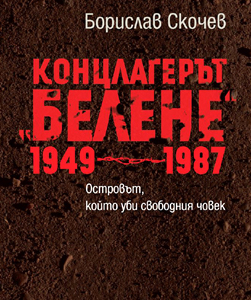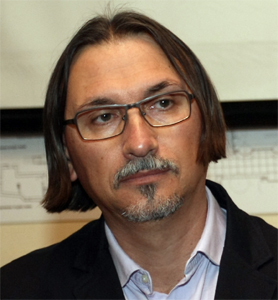“Turtles were the first to be captured and eaten on the island. Then camp prisoners would hunt frogs and water snakes, cats and dogs, jackdaws, hedgehogs and sparrows. The corpses of dead animals, of drowned horses, of pigs died of pestilence, of foxes and wild cats killed by the militia officers after having taken their fur… Some would even wash the horses’ stools and eat the barley grain which had remained indigested. In 1952 – 1953 the camp prisoners began to eat young willow leaves and grass. Their memories recall a special order issued back then, banning grazing…”
 A special book will be released across bookstores on December 6th – based on documents and testimonies it will reveal the full picture of the Belene crime – the island that killed the free person, to anyone who would dare to co-experience the truth. Its author Borislav Skochev has been researching Bulgarian and foreign archives for a decade, in order to finally present some 1,000 pages of full research – showing in detail the structure, the monstrous repression and the humiliation of the person within the largest communist concentration camp in Bulgaria. Today the writer refuses to appear in public, so another researcher of the communist regime, proclaimed criminal by the law in Bulgaria, talks about the book:
A special book will be released across bookstores on December 6th – based on documents and testimonies it will reveal the full picture of the Belene crime – the island that killed the free person, to anyone who would dare to co-experience the truth. Its author Borislav Skochev has been researching Bulgarian and foreign archives for a decade, in order to finally present some 1,000 pages of full research – showing in detail the structure, the monstrous repression and the humiliation of the person within the largest communist concentration camp in Bulgaria. Today the writer refuses to appear in public, so another researcher of the communist regime, proclaimed criminal by the law in Bulgaria, talks about the book:
 “Borislav Skochev is the author of Belene Concentration Camp – 1949 – 1987 – we know him from his De-communization website which turned into the first online platform, dedicated to the overcoming of our totalitarian past’s dependencies,” Hristo Hristov says. “The man is neither a historian, nor a journalist, but has always been a civic activist and he hasn’t missed a single pilgrimage to the Second Site on the Persin Island – the place where the camp was situated.”
“Borislav Skochev is the author of Belene Concentration Camp – 1949 – 1987 – we know him from his De-communization website which turned into the first online platform, dedicated to the overcoming of our totalitarian past’s dependencies,” Hristo Hristov says. “The man is neither a historian, nor a journalist, but has always been a civic activist and he hasn’t missed a single pilgrimage to the Second Site on the Persin Island – the place where the camp was situated.”
This research is the first of that large scale and on nearly each page one discovers something new. In his book Borislav Skochev reveals the political reasons behind the camp’s establishment, also the different group categories of people imprisoned there, the forced labor, the escape attempts, the executions…
“The camp was established by a classified decree of the Council of Ministers on 27 April 1949,” Hristo Hristov says. “Of course, the communist party didn’t invent anything new, but simply boosted the violence and torture, copy-pasted from the sample – the monstrous Soviet GULAG. It’s an interesting fact that Belene used to be a village back then and, as the State Security archives themselves testify, they expected trouble there due to the Catholic population and the zero impact of the communist party. However, the Persin Island was selected because of its isolate geography with the idea to transfer there the prisoners from the other camps. Belene was active till 1953 – till the death of Stalin and afterwards the regime would loosen its grip a bit. Some 15,000 were imprisoned there – quite many people for small Bulgaria. One should bear in mind that 18,000 – 30,000 people were executed by the so-called People’s Court over the first months of the communist terror, many of them simply disappeared. Another 10,000 were officially sentenced by this illegal tribunal.”
The camp’s administration was inventive in a really pervert manner in the implementation of moral, physical and psychological terror over the camp prisoners – from breaking them down through hunger to shots without any warning. These facts are held back and the recent crawling incitement of public myths on the “secure and peaceful life during socialism” make those civic activists who wouldn’t let the truth sink in oblivion continue their fight for an up-to-date history classes, based on the facts of the totalitarian regime in Bulgaria.
“The historic community owes to the society, as historians should be the people who illuminate. The book of Mr. Skochev is indicative in this relation – he is not a professional historian, but is truly devoted to the remembrance of the communist crimes and the revealing of the truth,” Mr. Hristo Hristov says in conclusion.
English version: Zhivko Stanchev
From 23 to 28 September, Sofia and Vidin will host the 7th International Conference on the Roman Danubian Provinces on the theme "Frontier Landscapes along the Danube", reports BNR Vidin. The initiative was taken by the University of Ferrara, Italy...
The independence of Bulgaria was proclaimed on 22 September, 1908. After the most audacious independent act in Bulgarian history – the unification of Eastern Rumelia with the Principality of Bulgaria – Bulgarians once again demonstrated the power of..
Bulgarian archaeologists have discovered a second statue in the large sewage channel of the ancient city of Heraclea Sintica. Around 11 a.m. on September 20, the team led by Professor Dr. Lyudmil Vagalinski came across another marble sculpture near..
There are three special days on the calendar of the Bulgarian Orthodox church, on which believers pray to God and give alms to honour the memory of..
Volunteers joined the efforts to clean and restore the monastery St. Spas near Bakadzhik peak. The campaign is being organized on 2 November by Stoimen..

+359 2 9336 661
